The Death of Magic
For centuries, humans have been fascinated by the concept of magic - the idea of supernatural powers and mystical abilities. Stories of witches, wizards, and magicians have captured our imagination and inspired us to believe in the impossible. However, as technology continues to advance at an unprecedented rate, some argue that it has resulted in the death of magic.
But in recent years, technology has advanced at an unprecedented rate, bringing with it a new kind of wonder and possibility.
Technology has allowed us to achieve things that were once thought impossible. We can now communicate instantly with people on the other side of the world, access vast amounts of information at the click of a button, and even create virtual realities that simulate real-life experiences. These advancements have made our lives easier and more convenient, but they have also led to a shift in the way we perceive the world around us.
As technology has become more prevalent in our lives, our belief in magic has diminished. We no longer need to rely on supernatural powers to achieve what we want.
With virtual reality, artificial intelligence, and other cutting-edge technologies, we can now do things that would have once seemed like magic. But as technology continues to evolve, some worry that it may also be causing the death of magic as we know it.
So, what exactly do we mean by "the death of magic"? In this context, we're talking about the loss of the sense of wonder and mystery that has always been associated with magic. As technology continues to make seemingly impossible things possible, the things that once seemed magical to us are becoming more and more mundane.
Consider the example of virtual reality. When the first VR headsets hit the market a few years ago, they were hailed as a revolution in gaming and entertainment. People marveled at the way they could be transported to entirely new worlds, experiencing things that they never could in real life. But now, VR has become much more common, and the sense of wonder that once accompanied it has faded.
Similarly, consider the way that we interact with artificial intelligence. Once upon a time, the idea of talking to a computer that could understand us and respond in a natural-sounding voice would have seemed like science fiction. But now, with the prevalence of virtual assistants like Siri and Alexa, it's become a routine part of our lives.
So, does this mean that technology is killing off magic altogether? Not necessarily. While it's true that the things that once seemed magical are becoming more commonplace, that doesn't mean that they can't still inspire a sense of awe and wonder. It all depends on how we approach them.
One way to preserve the sense of magic in a world of ever-advancing technology is to focus on the human element. Even the most sophisticated AI or VR technology is ultimately just a tool created by humans, and it's the people behind the technology who make it truly magical. By emphasizing the creativity, ingenuity, and passion of the people who are pushing the boundaries of what's possible, we can keep the sense of wonder alive.
Another way to maintain the magic in a technological world is to recognize that there's still so much that we don't know. Despite all the incredible advances that we've made in recent years, there are still mysteries and unknowns that we're only beginning to explore. By embracing the unknown and the unexplained, we can keep the sense of magic and wonder alive.
In conclusion, while it's true that technology is changing the way that we think about magic, it doesn't have to mean the death of magic altogether. By focusing on the human element and embracing the unknown, we can continue to find awe and inspiration in the world around us, whether it's made of flesh and blood or ones and zeroes.
















